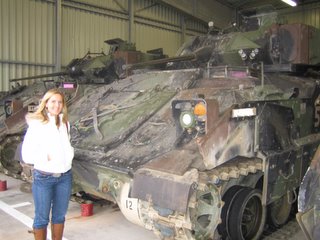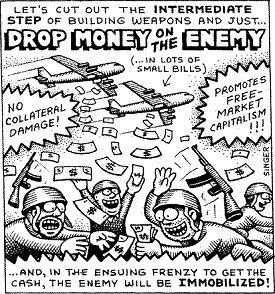Everyone is posting their two cents on this issue, so I thought it was about time I publicized my thoughts.
The war in Iraq, and to a lesser extent, the war in Afghanistan, are central issues to American political life. In fact, they are central issues to just plain American life. There is no getting away from it. You turn on the news, there are pictures from Iraq. You watch evening programming and “
Over There” comes on. You drive to the supermarket, and the car in front of you has a yellow ribbon magnet on the back.
There is no other issue like this in America, which demands that you take a stance. You would really have to look hard to find someone who has zero opinion on the conflicts. And by forming an opinion on this conflict you are to a certain extent aligning yourself with a political party. “You are either with us, or against us”, both sides seem to be screaming.
There are two extremes, while most people are kind of in the middle. On the one side, you have the so-called Patriot Police, who claim that supporting the president is a prerequisite to supporting the troops. Then on the other side you have Cindy Sheehan and the likes of the Code Pinkers, who claim that if you really support the troops, you have to be against the war and anything that puts them in harm's way. And suddenly the American soldier has been thrown into the center of this conflict. There is a tug-o-war from all sides, all claiming to have the soldier's best interests at heart.
During the Vietnam War, anti-war protesters made the mistake of aiming their wrath against soldiers. Which was ever more the absurd considering that there was a draft at the time, and many soldiers were in the military against their will.
This time the anti-war movement has learned from its mistakes, and decided to change the tone of their protests. They are no longer protesting against the soldiers, but just against the war and the president.
However, one can't help to feel that they are veiling their anti-military stance. Protesting ROTC at colleges, recruiting offices, and Walter Reed doesn't smack of military support. They portray soldiers as victims of the government. Soldiers have been tricked into a military career through promises of an education, and socio-economic chances previously previously out of their reaches.
The military career is not a prestigious and respectful one in their eyes. It's not a choice anyone would make out of a sense of duty, or even a career that one could possibly enjoy. It seems that their way of combating war is to make sure there are no more soldiers to fight it. Which is about as logical as getting rid of all the police, to reduce crime.
Also when you read something like
this, you can't help but think that anti-war protesters just aren't on the soldiers' side, no matter what they claim:
Members of Families for Peace, Code Pink and Global Exchange told a news conference in Amman that they had sent 600,000 dollars' worth of humanitarian aid to residents of the Iraqi town of Fallujah displaced by last month's massive US-led assault.
In an allergic reaction to anti-war protesters claiming to have soldiers' best interests at heart, there have been knee-jerk reactions on the right, stating that one has to support the president or support the war, if you really claim to support the soldiers. However, this is flawed logic.
Soldiers are supposed to remain apolitical. They abide by the oath they made upon joining the military:
"I do solemnly swear that I will support and defend the Constitution of the United States against all enemies, foreign and domestic; that I will bear true faith and allegiance to the same; and that I will obey the orders of the president of the United States and the orders of the officers appointed over me, according to regulations and the Uniform Code of Military Justice."
Regardless of whether they like or agree with the president, they must obey orders coming from the president or officers commanding them. Whether or not they agree with the US involvement in Iraq or Afghanistan, they are contractually bound to perform their duties. That is just how the military works. Its members can't vote on whether or not they want to take part in a conflict. That is up to the members of Congress and the President, who were elected according to procedures outlined in the Constitution. The only influence the soldiers can have on the outcome of these decisions is like everyone else: by voting in presidential and congressional elections. By the time they are given orders, it is beyond their control.
A friend of mine, a captain in the infantry, summed it up best: “I don't support the president. Presidents come and go. I support and defend the Constitution.” It doesn't matter if a soldier supports Bush or not. Kerry could have just as easily been the commander in chief now, and soldiers would be obeying his commands. The luxury of “supporting” the president doesn't even come into the equation.
On the topic of "Support the Troops but Not the War", Sgt. Hook
writes:
I’ve heard this mantra many times and I can understand where some might see nothing wrong with such a statement. From a soldier’s perspective (mine), supporting one without the other doesn’t work. A soldier goes to war believing in what he or she is doing. We don’t pick up arms to fight an unjust war, ever. It is the core of the American soldier and what makes our Army the greatest in the world. By supporting the troops but not the war, you are discounting our beliefs, our values. We don’t like war. We aren’t a bunch of brainwashed, imbecilic war mongers. We are warriors who believe that when our nation calls, it is for a just cause. And we answer that call for we will always support America and defend our way of life. Always. So when Americans don’t support what we are doing for them, then from a soldier’s perspective (again, mine), they aren’t supporting the troops either.I disagree with Hook. I personally know a few soldiers who are against this war in some shape or form, either America's reasons for invading Iraq or the way the conflict is being handled. But they perform to the utmost in their duties, and they fulfill their mission and support their brothers and sisters in arms. They also witness firsthand the positive effects they are having in Iraq.
Steven Kiel, a reservist serving in Iraq writes
this:
I understand some people in America are calling for us to come home, no matter the consequences. I understand some are wary of this conflict and their confidence is shaken. It’s difficult for a soldier to hear those things and not begin to question himself and his mission.
To support the soldiers, one must see the good in the missions. If one's lack of support in the war or the Bush administration blinds one from seeing anything positive in America's involvement in Iraq, it is impossible to support the troops. You might as well join Cindy Sheehan.
And that's all she wrote...Your two cents would be greatly appreciated.





